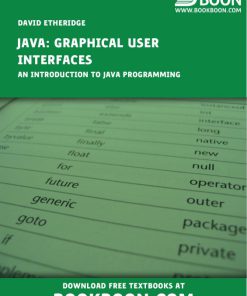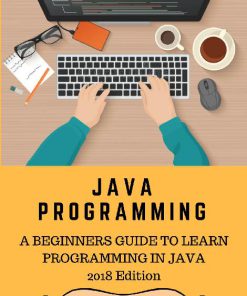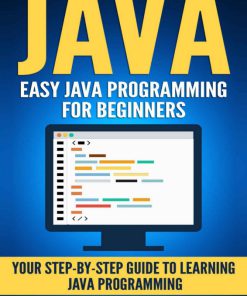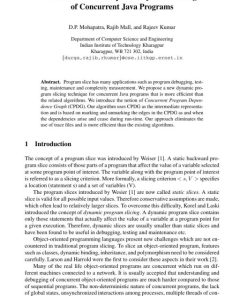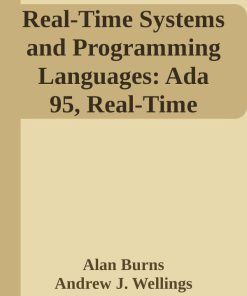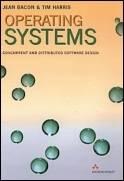Java Threads Understanding and Mastering Concurrent Programming 3rd Edition by Scott Oaks, Henry Wong ISBN 0596007825 9780448446257
$50.00 Original price was: $50.00.$25.00Current price is: $25.00.
Authors:By Scott Oaks, Henry Wong , Series:Computer Science [304] , Author sort:By Scott Oaks, Henry Wong , Ids:0596007825 , Languages:Languages:eng , Publisher:O’Reilly , Comments:Comments:Published September 2004, 360 pages.
Java Threads Understanding and Mastering Concurrent Programming 3rd Edition by Scott Oaks, Henry Wong – Ebook PDF Instant Download/Delivery. 0596007825, 9780448446257
Full download Java Threads Understanding and Mastering Concurrent Programming 3rd Edition after payment

Product details:
ISBN 10: 0596007825
ISBN 13: 9780448446257
Author: Scott Oaks, Henry Wong
Threads are essential to Java programming, but learning to use them effectively is a nontrivial task. This new edition of the classic Java Threads shows you how to take full advantage of Java’s threading facilities and brings you up-to-date with the watershed changes in Java 2 Standard Edition version 5.0 (J2SE 5.0). It provides a thorough, step-by-step approach to threads programming. Java’s threading system is simple relative to other threading systems. In earlier versions of Java, this simplicity came with tradeoffs: some of the advanced features in other threading systems were not available in Java. J2SE 5.0 changes all that: it provides a large number of new thread-related classes that make the task of writing multithreaded programs that much easier. You’ll learn where to use threads to increase efficiency, how to use them effectively, and how to avoid common mistakes. This book discusses problems like deadlock, race conditions, and starvation in detail, helping you to write code without hidden bugs. Java Threads, Third Edition, has been thoroughly expanded and revised. It incorporates the concurrency utilities from java.util.concurrent throughout. New chapters cover thread performance, using threads with Swing, threads and Collection classes, thread pools, and threads and I/O (traditional, new, and interrupted). Developers who cannot yet deploy J2SE 5.0 can use thread utilities provided in the Appendix to achieve similar functionality with earlier versions of Java. Topics include:
- Lock starvation and deadlock detection
- Atomic classes and minimal synchronization (J2SE 5.0)
- Interaction of Java threads with Swing, I/O, and Collection classes
- Programmatically controlled locks and condition variables (J2SE 5.0)
- Thread performance and security
- Thread pools (J2SE 5.0)
- Thread groups
- Platform-specific thread scheduling
- Task schedulers (J2SE 5.0)
- Parallelizing loops for multiprocessor machines
In short, this new edition of Java Threads covers everything you need to know about threads, from the simplest animation program to the most complex applications. If you plan to do any serious work in Java, you will find this book invaluable. Scott Oaks is a senior software engineer for the Java Performance Engineering group at Sun Microsystems and the author of four books in the O’Reilly Java series. Formerly a senior systems engineer at Sun Microsystems, Henry Wong is an independent consultant working on various Java related projects.
Java Threads Understanding and Mastering Concurrent Programming 3rd Table of contents:
-
Introduction to Concurrency and Threads
- Understanding Concurrency in Java
- The Need for Threads in Java Applications
- Threading and Its Role in Modern Computing
- Basic Concepts in Multithreading
- Overview of Java’s Concurrency Model
-
The Thread Class and Runnable Interface
- Creating Threads in Java
- Using the Thread Class
- The Runnable Interface
- Differences Between Extending Thread and Implementing Runnable
- Thread Lifecycle and States
-
Thread Scheduling and Thread Pools
- Thread Scheduling Mechanisms
- Thread Priorities and Execution Control
- Thread Pools: Purpose and Usage
- Using the Executor Framework for Thread Management
- Thread Pool Executors and Scheduling Tasks
-
Synchronization: Ensuring Safe Access to Shared Resources
- The Need for Synchronization
- Using Synchronized Methods and Blocks
- Locking Mechanisms in Java
- The
volatileKeyword and Memory Visibility - Deadlocks, Race Conditions, and How to Avoid Them
-
Advanced Threading Techniques
- Thread Communication (Inter-Thread Communication)
- The
wait(),notify(), andnotifyAll()Methods - Using the Condition Interface for More Control
- Thread Local Variables
- Creating and Managing Daemon Threads
-
The Fork/Join Framework
- Introduction to the Fork/Join Framework
- Splitting Tasks and Recursive Task Management
- Using
ForkJoinPoolfor Parallel Task Execution - Performance Considerations and Optimizations
- Handling Task Failures in Fork/Join Framework
-
Concurrency Utilities in Java
- Overview of the
java.util.concurrentPackage - Concurrent Collections (e.g.,
ConcurrentHashMap,CopyOnWriteArrayList) - The
CountDownLatchandCyclicBarrierClasses - The
SemaphoreandExchangerClasses - The
BlockingQueueInterface and Implementations
- Overview of the
-
Java Memory Model (JMM)
- Understanding the Java Memory Model
- Visibility, Atomicity, and Ordering of Variables
- How the JMM Affects Concurrency and Multithreading
- Happens-Before Relationship
- Memory Consistency Errors and How to Avoid Them
-
Thread Safety and Design Patterns
- Designing Thread-Safe Classes
- Immutable Objects and Their Role in Concurrency
- Using the Singleton Pattern in Multithreaded Environments
- The Producer-Consumer Problem and Solutions
- Thread-Safe Singleton Implementations
-
Performance and Scalability
- Threading Performance Considerations
- Optimizing Multithreaded Applications
- Load Balancing and Scalability in Concurrent Systems
- Thread Contention and Resource Management
- Benchmarking and Profiling Multithreaded Code
-
Concurrency Debugging and Testing
- Debugging Multithreaded Applications
- Common Concurrency Bugs and How to Detect Them
- Testing Concurrency in Java Applications
- Tools for Analyzing Multithreaded Programs
- Logging and Monitoring Concurrency Issues
-
Designing Concurrent Applications
- Architectural Patterns for Concurrent Systems
- Designing Scalable Systems Using Threads
- Asynchronous Programming Models
- Event-Driven and Reactive Programming in Java
- Handling Failures and Recovery in Concurrent Applications
-
Multithreading in Java EE and Other Frameworks
- Managing Threads in Java EE Applications
- Multithreading in Servlet and EJB Containers
- Handling Asynchronous Tasks in Java EE
- Concurrency in Distributed Systems (e.g., Microservices)
- Integrating Concurrency with Java Frameworks
-
Case Studies and Real-World Applications
- Case Study 1: Building a Concurrent Web Server
- Case Study 2: Real-Time Data Processing
- Case Study 3: Parallel File Processing System
- Lessons Learned from Real-World Multithreaded Applications
People also search for Java Threads Understanding and Mastering Concurrent Programming 3rd:
java threads
which of the following statements about java threads is correct
how can synchronization be achieved in java threads
types of java threads
java threads interview questions




